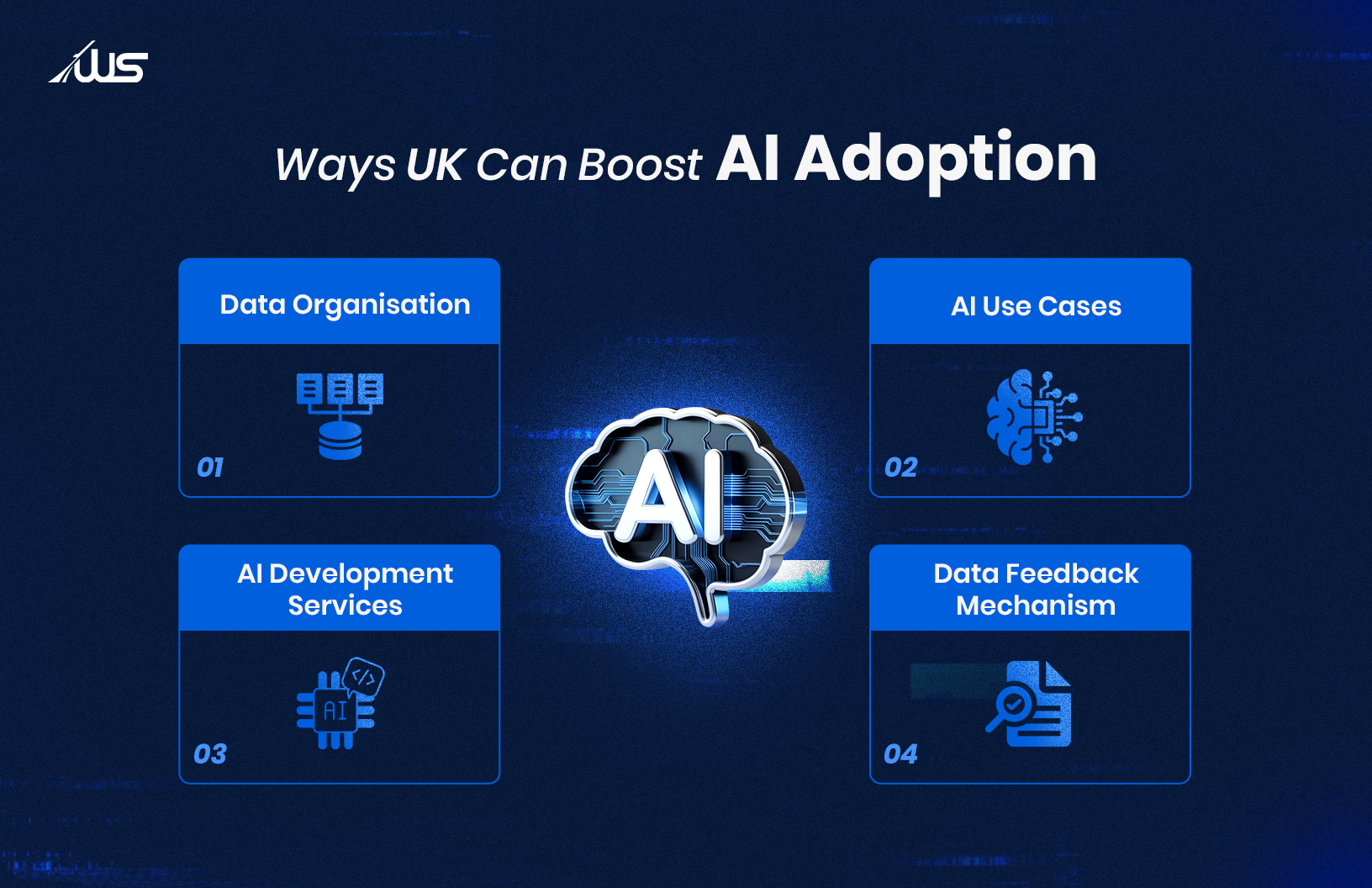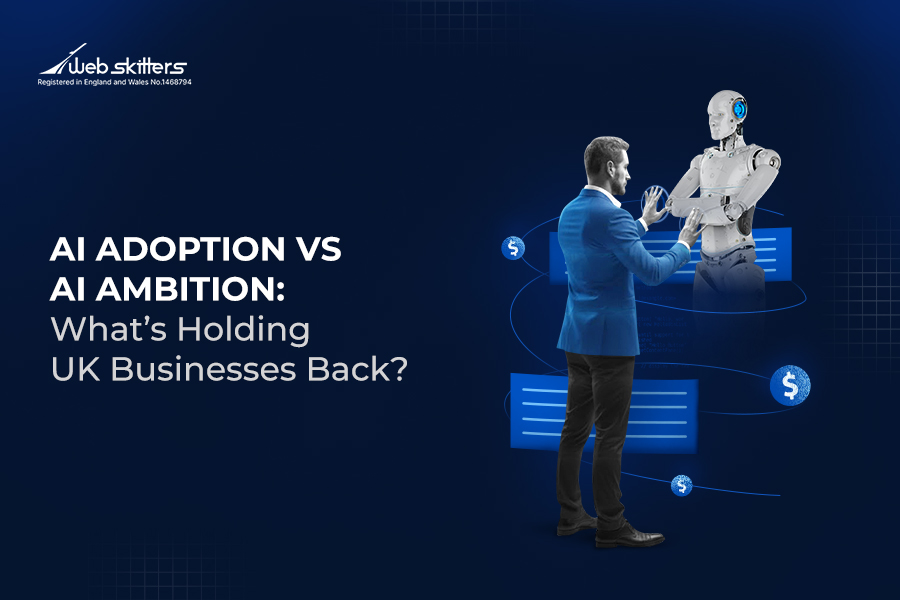Equinix, a digital infrastructure group, announced its plans to invest 3.9 billion GBP on AI data centres in the county of Hertfordshire (North of London). Although this is a significant boost to the UK’s AI ambitions, it will be in vain if AI adoption remains low.
Microsoft and Google are also set to inject billions of US dollars into Britain’s AI industry. So, AI adoption by businesses in the UK is crucial, and companies providing AI development services will be at the forefront.
But why is it so?
Despite its booming AI market and strong research foundation, the UK struggles to adopt AI effectively due to poor data quality, limited AI skills, and high talent costs. Closing this adoption gap is vital for the UK’s goal of becoming a global AI hub.
Before jumping into AI adoption and its effects on the UK economy, let’s look at the current state of AI in the UK.
What is the State of AI in the UK?
The UK is among the top countries in AI readiness and demonstrates formidable research capabilities in finance, cybersecurity, and healthcare.
Let’s look at some stats that back this statement.
- The UK government ranked 5th in the Global AI Readiness Index and was a runner-up in Western Europe.
- According to government data, https://www.gov.uk/government/publications/national-ai-strategy/national-ai-strategy-html-versionthe UK government has allocated 2.3 billion GBP to various AI initiatives since 2014.
- The Guardian reported in 2023 that the UK government was expected to inject 900 million GBP into its AI strategy.
Despite this potential, the AI adoption rate in the UK has yet to realise its estimated potential.
What data says about AI adoption in the UK?
- According to a Databricks report, 91% of UK business leaders acknowledge issues with AI adoption.
- Moneypenny’s survey found that only 39% of UK businesses were using AI in some capacity in 2025. 61% of the remaining UK businesses are either considering implementing it or not considering using it at all.
- The same survey also found that only 28% were fully integrating AI in their organisation. For others, the AI adoption approach was more selective.
So, all this data suggests that AI adoption in the UK is not as expected, which is a concern if the UK is looking to become a global AI leader.
However, the AI market statistics give us a completely different picture. Let’s look at those.
- According to UK government data, the AI market in the UK exceeded 72 billion GBP in 2024.
- US ITA (International Trade Administration) estimates that the UK AI market will reach 1 trillion GBP by 2035.
- The UK ONS (Office for National Statistics) states that the number of AI companies in the UK has increased by more than 600% over the last decade.
All this data suggests the UK AI market has massive potential.
Experts suggest that the gap between AI potential and AI adoption in the UK lies between practical integration and research leadership. This can clearly undermine the UK government’s ambition to make the UK a global AI hub.
The UK government is doing everything it can to fulfil its ambition. The AI Action Plan, which aims to lay the foundations for AI adoption and regulation in the UK, justifies this initiative.
If you want to know more about the AI Opportunities Action Plan and its implications in the UK, you can check out “UK’s AI Ambitions: What AI for Business Means, Trends & More”.
But ambition and effort mean nothing if not practically implemented.
So, there must be some barriers for UK businesses that are deterring them from adopting AI.
Challenges of AI Adoption for UK Businesses
Poor Data Quality
“Effective AI adoption is impossible without strong data foundations. Yet, many UK businesses still struggle with data quality issues,” — Michael Green, UK and Ireland MD at Databricks.
Poor data quality remains a key barrier to successful AI adoption in the UK. According to a Databricks report, 91% of leaders in the UK say poor data quality affects business operations and limits the effectiveness of AI.
As data is at the core of AI structures, strong data foundations are a prerequisite for an AI-driven growth in the UK.
Lack of AI Literacy
Another major hurdle to the UK’s AI adoption is the lack of skilled workers who know how to deal with AI.
“AI tools are only as effective as the people trained to use them. A lack of AI literacy within organisations remains one of the biggest barriers to successful deployment,” adds Michael.
According to PWC’s CEO Survey, 79% of CEOs said they have seen no profitability gains from Generative AI, and 78% said they have seen little to no revenue gains.
This is because the UK workforce isn’t skilled enough to make use of AI and make an impact. Another PWC Survey, the UK Workforce Hopes and Fears Survey, found that only 15% of UK workers leverage Gen AI daily. The share came down to 7% when it comes to working with Agentic AI.
This can be tackled by structured training programmes for organisational AI adoption and integration.
Increasing Hiring Costs
Increased demand for AI talent and limited supply drive up hiring costs. As a result, businesses in the UK are paying 14% more for AI expert roles.
“Without this internal expertise, businesses often rely on generic third-party solutions that may not align with their unique operational needs,”— Michael Green.
This makes it harder for small businesses and those with limited investment capacity to hire the right talent. The inability to do so may result in low AI adoption in the UK.
These are some of the significant challenges the businesses in the UK are facing in AI adoption. So, the government and companies need to make a roadmap to boost AI adoption in the country.
How to do that? Let’s find out!
How Businesses in the UK Can Accelerate AI Adoption?

To make sure the AI adoption is efficient and smooth, businesses in the UK can follow the following steps:
- Data Organisation: As already discussed, the data quality plays a significant role in AI adoption. Poor data quality is one of the top concerns for businesses in the UK. So, enterprises should identify and define their data assets. This will let them drive meaningful insights from the datasets. These insights will then help them make decisions to achieve the maximum impact.
- Identifying AI Use Cases: Before AI adoption, businesses should find out where they want to integrate the AI framework. For instance, if a business offers customer relationship management, they can opt for conversational AI. Similarly, in a marketing enterprise, Gen AI can be chosen.
- Choosing the Right AI Development Services: Businesses in the UK can choose the AI development path for AI adoption. If businesses want to integrate AI without a specific business goal in mind, they can opt for generic AI solutions. However, if the company wants to develop something unique with AI, the right path is to hire a custom AI development service provider. While the generic AI solutions are faster than custom ones, custom AI development services can align well with your business goals.
- Activating the Data Feedback Mechanism: For efficient AI adoption, businesses need to update their data regularly. This will make sure the AI models produce accurate responses. This will also help businesses to prevent stale data problems.
Now that we have defined some critical steps businesses in the UK can take to implement an effective AI adoption, let’s look at the benefits they can achieve.
What are the Benefits of AI Adoption for Businesses in the UK?
The advantages of AI adoption for businesses in the UK can range from cost reduction and competitive survival to regulatory readiness and hyper-personalisation. Let’s look at the top 3 benefits of AI adoption for businesses operating in the UK.
1. AI Adoption Can Enable Enhanced Decision-Making
AI can analyse huge chunks of data in a matter of seconds. The more the data is assessed, the better the insights that can be derived from it.
So, AI adoption can help businesses in the UK to make insight-driven decisions. The decisions are more intelligent and insight-driven, allowing businesses to take critical strategic steps.
2. AI Adoption Improves Organisational Efficiency
According to McKinsey’s report, improvements in AI safety can increase the potential of automation up to 3 hours per day. So, by AI adoption, businesses and enterprises can boost their automation capabilities.
Automation is a feature that improves productivity and efficiency by eliminating repetitive tasks and human errors. This, in turn, allows the workforce to focus on other essential business operations.
3. AI Adoption is great for personalisation.
In another McKinsey report, it was found that personalisation can drive a 10-15% increase in revenue for businesses. By providing personalised services or products, your business can connect with the audience on a deeper level.
AI adoption, on the other hand, can equip businesses with hyper-personalisation capabilities. This way, the businesses can provide personalised experiences which optimise the customer journey.
It’s Time to Ramp up AI Adoption!
If the UK wants to be a global AI leader, the UK government’s ambitions won’t be enough. The government must take steps to boost AI adoption.
On the other hand, the businesses in the UK will play a significant role in this AI revolution. Enterprises must understand the significant potential of AI integration and its potential to optimise business performance.
To reach new heights of sustainability and success, UK businesses must embrace AI technology.
Do you want to know more about custom AI development services?
Book a call with Webskitters Ltd. to learn how you can optimise your business operations through AI implementation.

